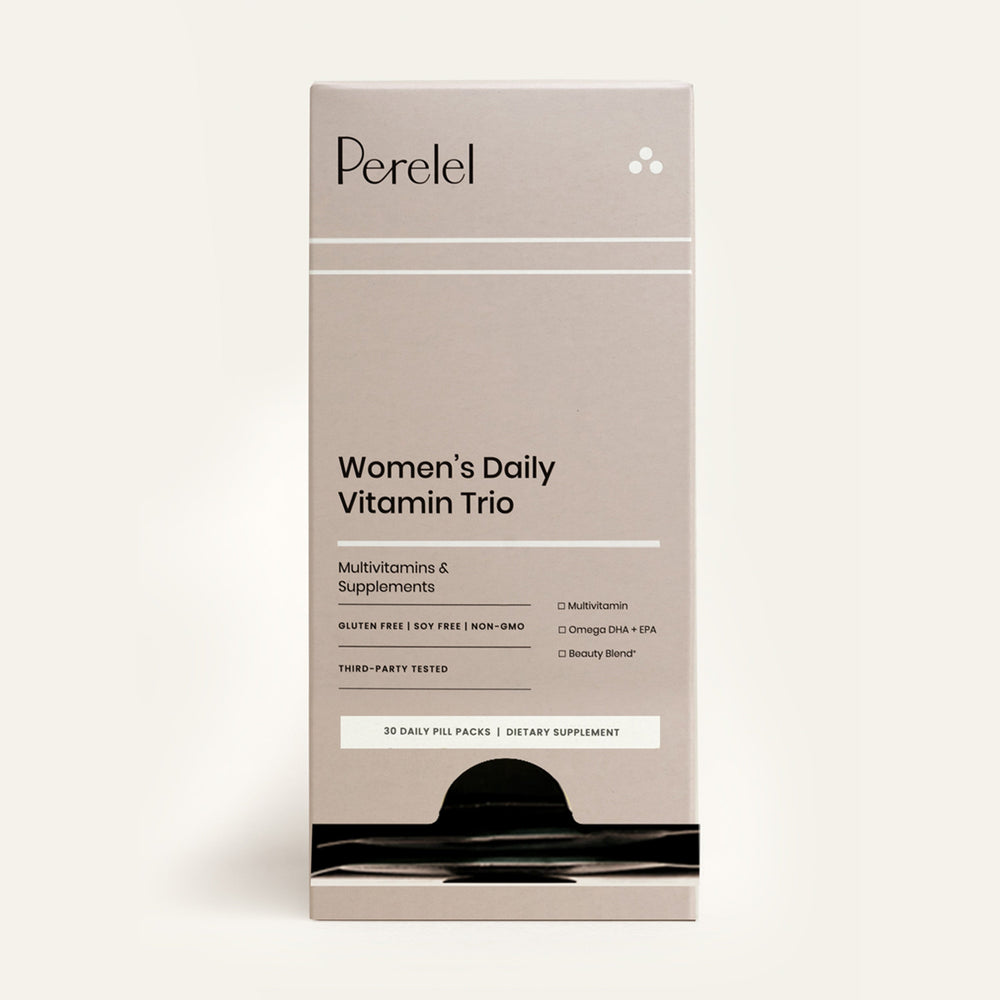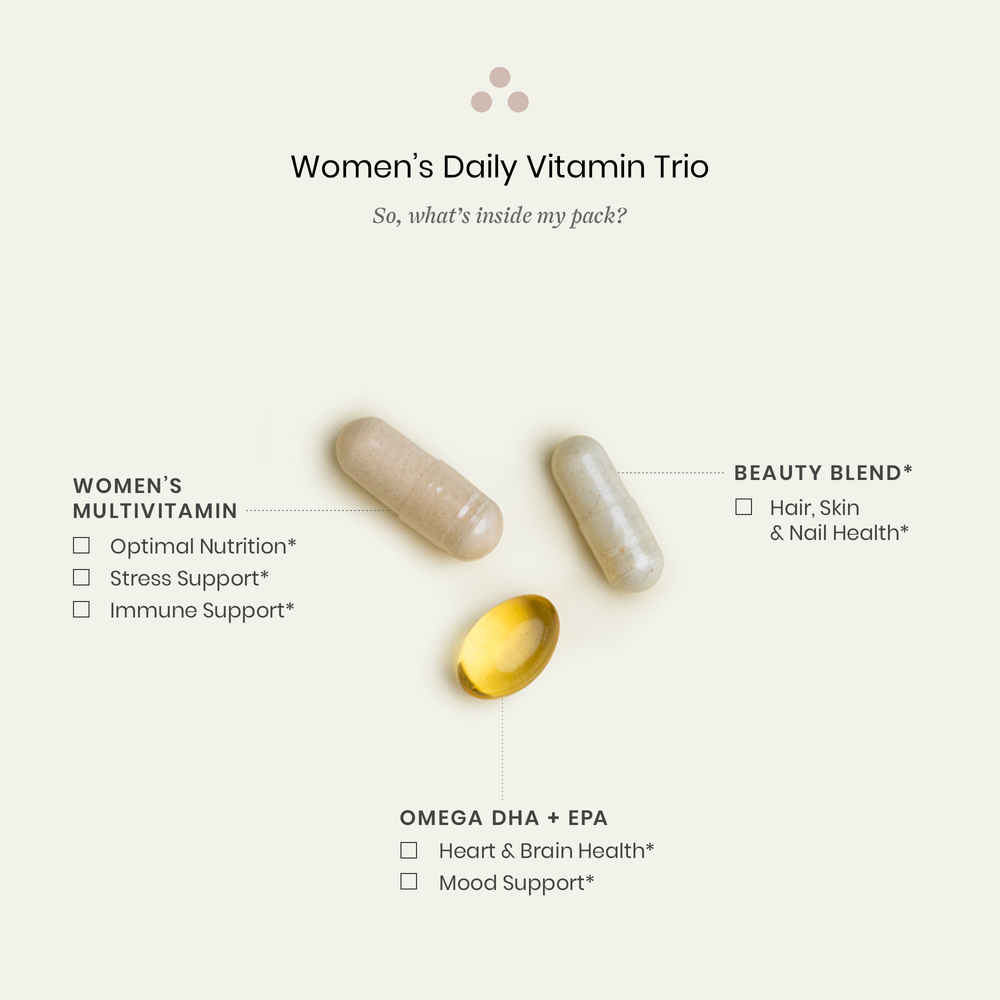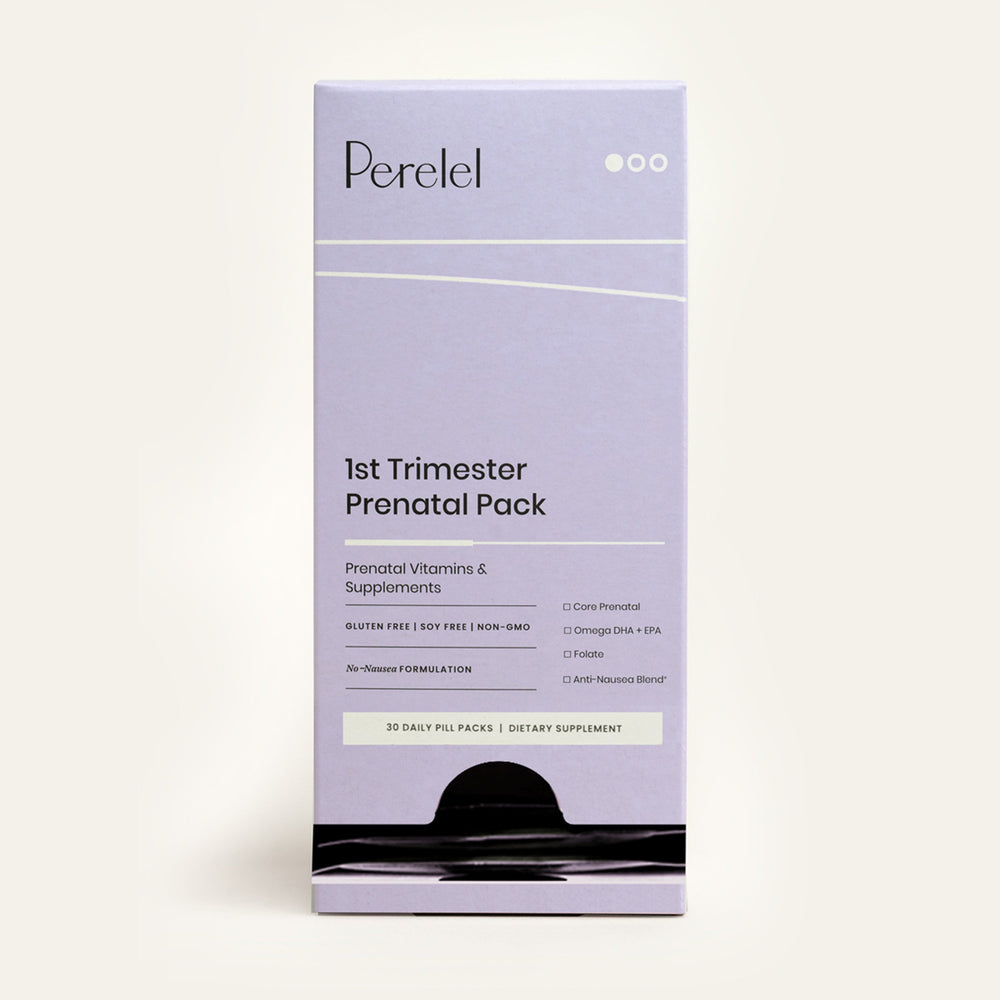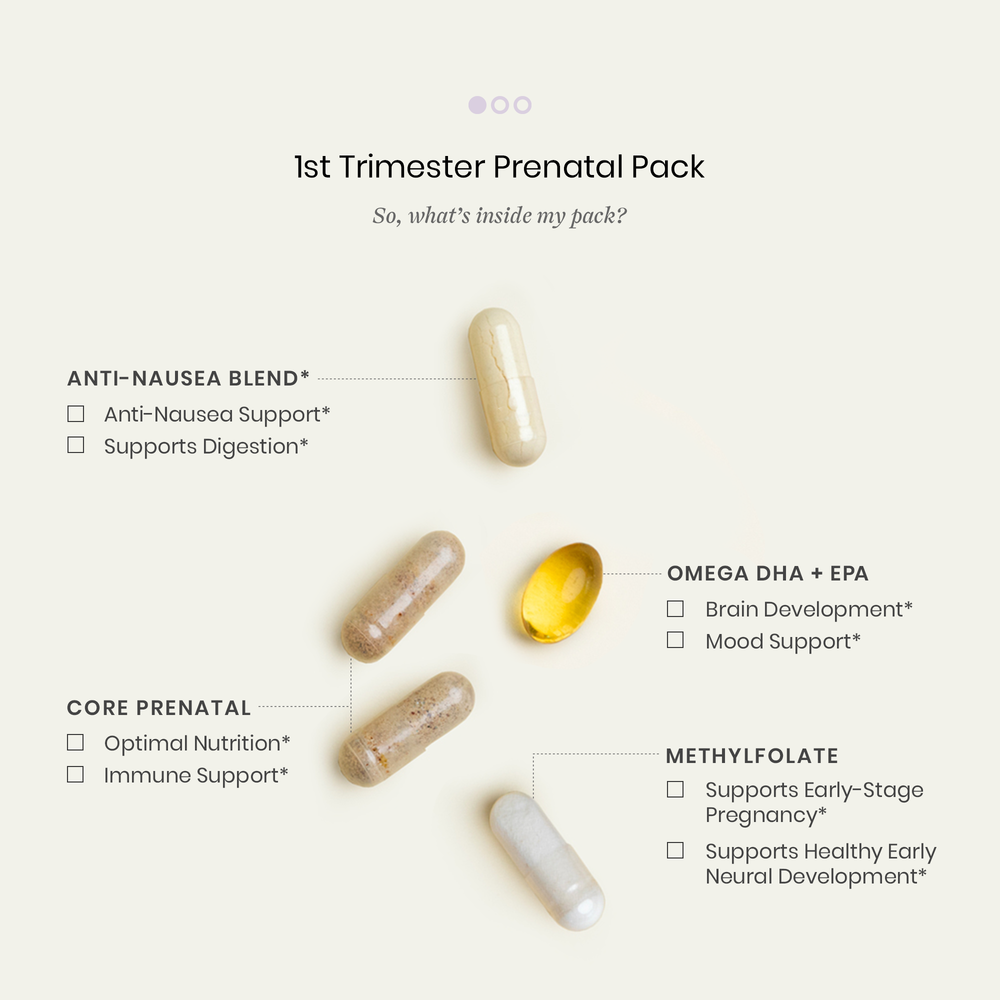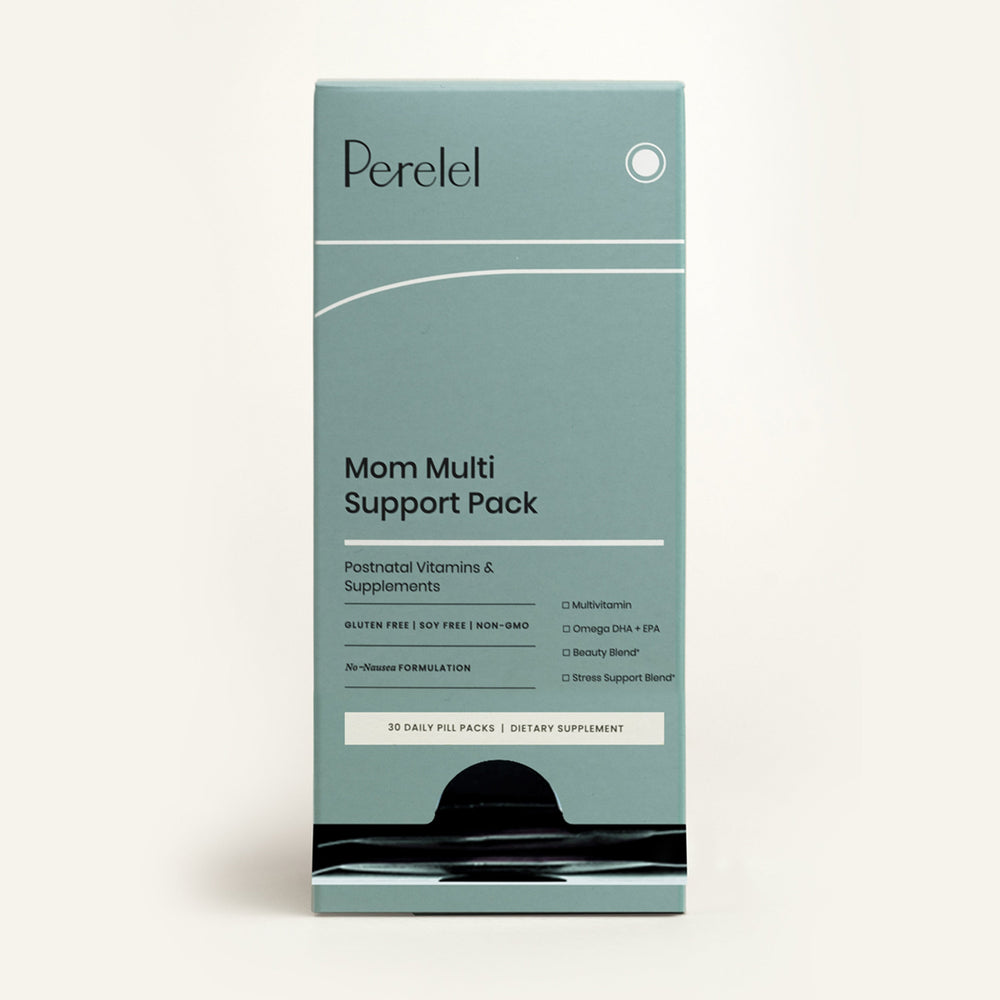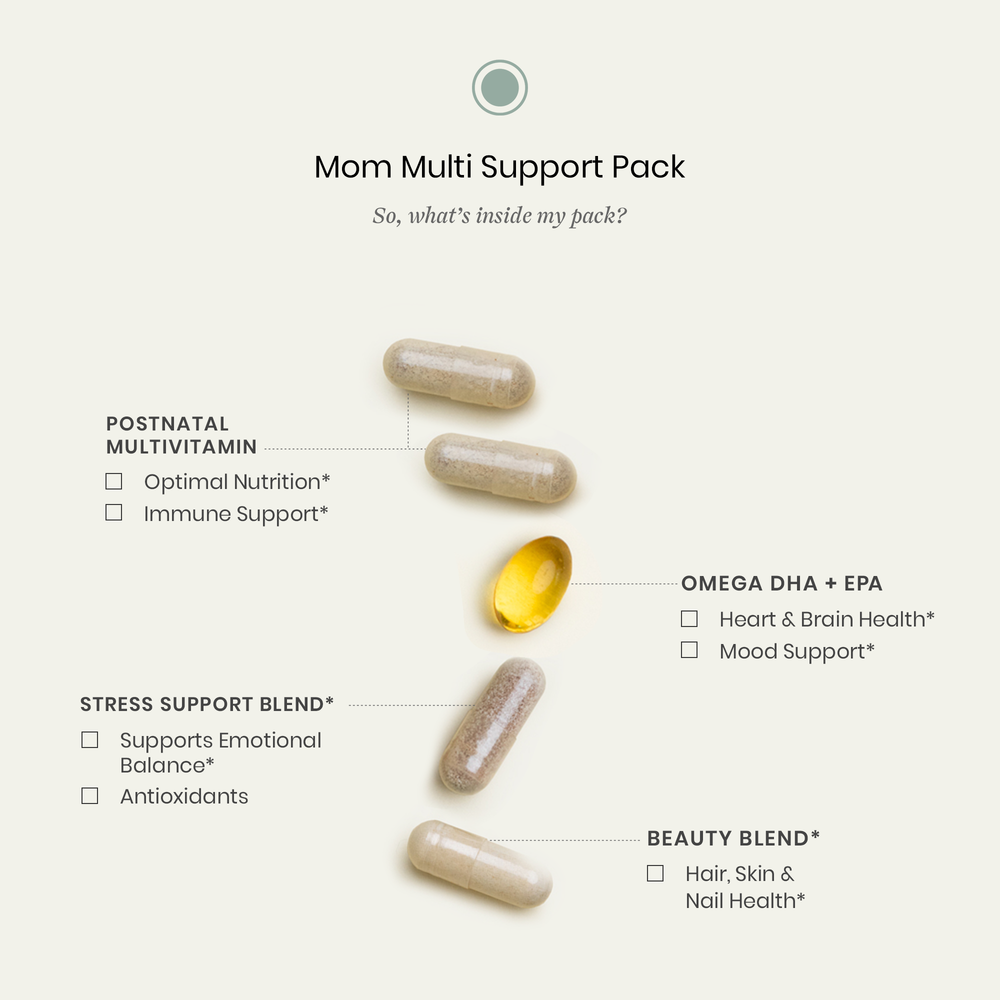Vitamin consumption has officially become mainstream: According to the latest Council for Responsible Nutrition (CRN) Consumer Survey on Dietary Supplements, 77 percent of Americans are taking supplements.1 The most popular are multivitamins—58 percent of Americans report taking these. The top reason survey takers gave for consuming dietary supplements are for overall health and wellness benefits.2
To better understand what those benefits are, we’re taking a deep dive into the subject of supplements—specifically multivitamins. From what they are to how they impact your body, we’ve got everything you need to know about multivitamins.
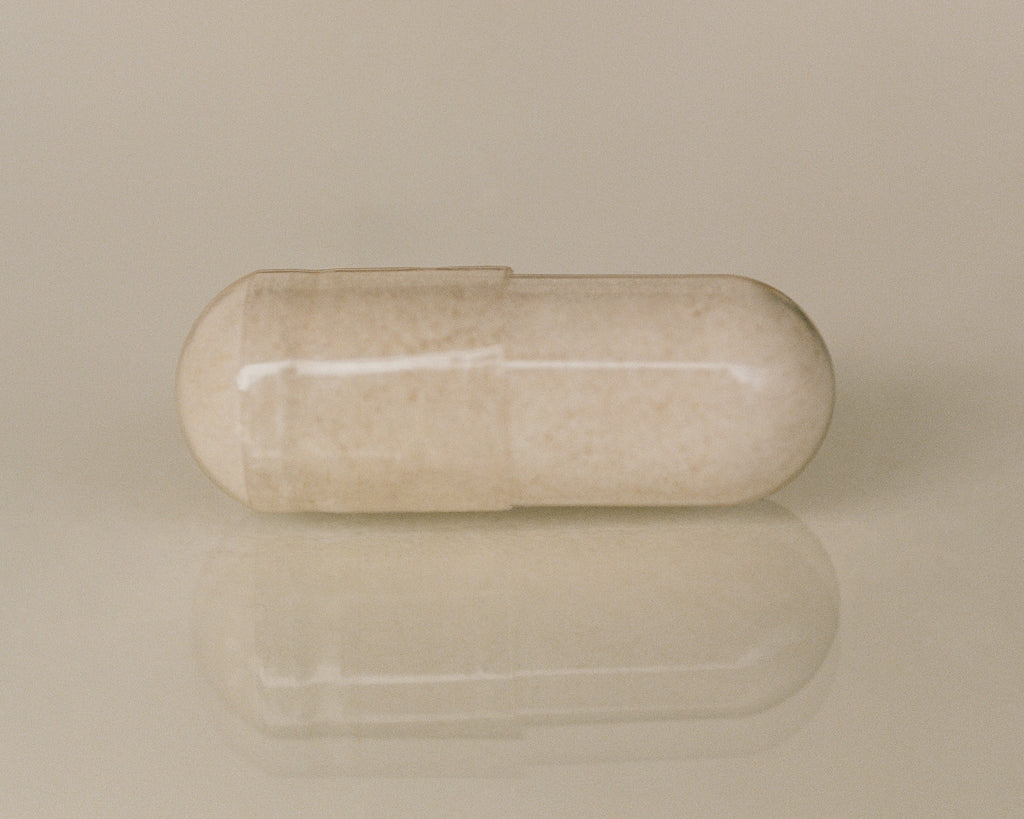
What Exactly Are Multivitamins?
“Multivitamin” is a broad term used to describe a dietary supplement containing a variety of vitamins and minerals. Multivitamins come in many forms—capsules, tablets, gummies, liquid and powder. There is no specific standard for the contents of this type of supplement, so the nutrient profile and concentration vary from product to product. Some multivitamins contain only vitamins and minerals, others include additional ingredients like herbs, amino acids and fatty acids. Some, like gummies and chewable tablets, may also include flavor agents like sugar.
Since nutrient needs vary depending on gender, age and diet, there are multivitamins tailored to kids, multivitamins geared toward parents, and multivitamins for older adults, to name a few. You can find these and other supplements in pharmacies, grocery stores and even online. Some multivitamin proponents recommend taking these supplements daily, others recommend taking multivitamins once a week.
If you’re considering adding a multivitamin—or any new supplement—to your daily regimen, it’s a good idea to consult with your doctor or a registered dietitian. They can evaluate your specific needs, and provide guidance on the best supplements for you.
What Happens To Your Body When you Take Vitamins Each Day?
The impact of taking a vitamin everyday will likely be subtle—especially if you already maintain a healthy lifestyle. But if your diet is lacking in certain nutrients, like iron, calcium and vitamin D, you may notice some improvements in deficiency symptoms once you start supplementing.
According to Registered Dietitian Natalie Filippone, MS RD LDN, “A common sign of iron deficiency is fatigue. In addition, dizziness, weakness and headache may be experienced in the case of iron deficiency. Individuals who don’t consume enough calcium may experience weakened bones that easily fracture if sustaining a fall or other injury. Vitamin D deficiency may cause weakness, fatigue and depression. A multivitamin can help to improve these symptoms by making up for areas in which diet is lacking,” says Fillipone.
5 Reasons to Take A Vitamin Each Day
Although the findings on the health benefits of vitamins are somewhat mixed, research suggests that regular consumption may be associated with the following:
-
They can help fill nutritional gaps in your diet.
If you follow a healthy diet—one that includes a wide variety of fruits and vegetables, whole grains, lean proteins and healthy fats, most experts agree that you can get all the nutrients your body needs to thrive.3
But the reality is that most people are falling short: According to the Centers for Disease Control and Prevention (CDC), only one in 10 Americans is meeting recommendations for fruit and veggie intake.4 Many are not meeting recommendations for whole grains.5 And the USDA and the U.S. Department of Health and Human Services’ 2015-2020 Dietary Guidelines for Americans indicates that vitamin D, calcium, potassium, dietary fiber, iron, choline, magnesium, and vitamins A, C and E are all being under-consumed by the US population.6 This is concerning since a deficiency in many of these nutrients can lead to some pretty serious health issues.
Even if you follow a healthy diet full of nutrient-dense foods, it’s still possible that you’re not getting enough of certain nutrients.
According to Filippone, “Even with the most well-balanced diet, sometimes food can’t meet every one of our body’s nutritional needs. For example, vitamin D is found in very few foods (milk, egg yolk, salmon and mushrooms exposed to UV light during production are some of the only sources). Not everyone can tolerate the lactose found in milk, and during certain times of the year we’re not able to get enough sun exposure to process vitamin D properly within the body, so supplementation may be needed.”
Taking a multivitamin that contains the nutrients your diet lacks can help prevent deficiencies that may be detrimental to your health.
-
They may help ward off disease.
Though the findings are mixed, there is some evidence that multivitamin consumption may be associated with a reduced risk of heart attacks and death.7,8,9 Interestingly, the impact may be different for men and women—a recent study revealed that among women only, taking a multivitamin for more than three years was associated with a lower risk of death from heart disease.10
There is also some research to suggest that multivitamin consumption may be linked to a reduced risk for cancer although again, the findings are mixed. In one study , long-term use of multivitamins was associated with reduced risk for colon cancer in women.11 Another study found that long-term intake of multivitamins was linked to a reduction in colon cancer for both men and women.12 Yet another study found that daily multivitamin supplementation slightly reduced the risk of total cancer in males.13
Further research is warranted before conclusions can be drawn about the impact of multivitamin usage on heart disease and cancer risk since other studies have demonstrated no correlation, but these findings are certainly promising.
-
They can boost your mood.
If you’re feeling a little down and out, taking a multivitamin regularly just might help: Research has established a link between nutrient deficiencies and poor mood.14,15 So it stands to reason that if your diet is lacking, taking a multivitamin that provides a nutritional boost might also provide a mood boost.
And the benefits extend beyond mood: Supplements have also been tied to a reduction in symptoms of anxiety and depression16,17,18,19.
-
They may help preserve your eye health.
According to findings from one study , taking antioxidant vitamins and minerals may prevent—or at least slow the progression of—age-related macular degeneration, which is a leading cause of blindness.20
Other research suggests that taking a multivitamin regularly may reduce your risk of developing cataracts.21
-
They help support a healthy pregnancy.
There are several nutrients that are of particular importance when you’re expecting. One of the most important is folate, a critical, water soluble nutrient that, when taken before and during pregnancy, prevents birth defects of the brain and spine in babies.22
“Folate is a B vitamin that plays an important role in growth and development. In early pregnancy, folate is a critical player in the development of a baby’s neural tube,” says Fillipone.
The neural tube is what later becomes the baby’s spinal cord, spine, brain and skull. Just a few weeks after conception, the neural tube forms in the embryo and then closes. When it fails to close properly, the result can be serious birth defects like anencephaly and spina bifida.23 Because these birth defects occur within the first four weeks of pregnancy—before most women even know they’re pregnant, and about half of all pregnancies are unplanned, we recommend all women of reproductive age to take a vitamin with folate to ensure they’re covered. Our medical experts recommend a daily folate dose of 700 mcg for most women, although some individuals may benefit from taking up to 4,000 mcg, especially if there is a history of neural tube defects.
Folate isn’t the only nutrient pregnant woman should consider supplementing. Fillipone says choline should also be a consideration since it’s also an important contributor to the development of the spinal cord and brain. Iron is another. “Iron helps prevent deficiency anemia, which pregnant women may be more at risk for due to their iron stores being used to support the growing fetus and placenta,” says Filippone.
Another critical nutrient? Vitamin D. “Vitamin D helps us absorb and metabolize nutrients that are important in bone growth (calcium and phosphorus),” Fillipone explains. It also plays a critical role in the healthy bone development of unborn babies.24
Research suggests that early multivitamin supplementation can be an effective way for pregnant women to achieve adequate vitamin D status.25

Which Multivitamin is Best for Me?
The best multivitamin for you depends upon a few factors, including your age and your gender—children have different nutrient needs than seniors; men and women require different amounts of nutrients.
You’ll also want to consider your diet. For example, if you follow a vegan diet, a multivitamin that contains B12 and iron—two nutrients that are largely present in animal products—can help ensure adequate intake. Choosing a multivitamin that contains calcium and vitamin D may also be a good move since these nutrients are most prevalent in dairy products.26
If you’re a woman of reproductive age, Perelel’s Women Daily Trio packs are an excellent option. The vitamins contained within the Trio packs fill common nutritional gaps and should meet most of a woman’s vitamin supplementation needs. They include the chelated form of key minerals, which is a fancy way of saying they optimize absorption in your body.
With these vitamin packs, you get mood and stress support thanks to ingredients like omega DHA and EPA and L-Thenine; immunity support due to vitamins D, C, and Zinc; plus, energy support from magnesium and B12. They also include selenium and iodine to support thyroid function, and a blend of vitamins to support your heart and brain, and overall health. The Trio also includes a biotin-collagen Beauty Blend to promote healthy hair, skin, and nails.*
And you can take these supplements worry-free—the formulations were developed by a panel of leading obstetricians, nutritionists, naturopathic doctors and endocrinologists. Every ingredient is backed by female-specific research along with the founding doctors' clinical insights.
Shop the Article:
Of course, as with any supplement, consult your doctor before taking these vitamins if you are pregnant, nursing, have a medical condition or are taking any medications. In fact, it’s a good idea to talk to your healthcare provider or a registered dietitian prior to starting any new vitamin regimen.
Are you looking to boost your nutrition? Shop the first OB/GYN-founded vitamin targeted to your exact stage of womanhood now. Plus, should we take a prenatal vitamin even if we're not pregnant? We asked an OB/GYN to weight in.
This article is for informational purposes only. It is not, nor is it intended to be, a substitute for professional medical advice, diagnosis, or treatment and we recommend that you always consult with your healthcare provider. To the extent that this article features the advice of physicians or medical practitioners, the views expressed are the views of the cited expert and do not necessarily represent the views of Perelel.
17"Zinc: the new antidepressant? - PubMed." https://pubmed.ncbi.nlm.nih.gov/16491668/.
19 "A double-blind placebo-controlled trial - PubMed." https://pubmed.ncbi.nlm.nih.gov/10907676/.
26 "What parents need to know about a vegan diet - Harvard Health." 7 Jan. 2020, https://www.health.harvard.edu/blog/what-parents-need-to-know-about-a-vegan-diet-2020010718625.


